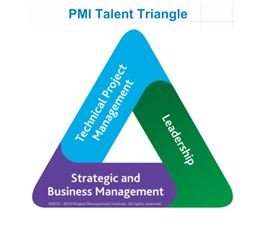PMI Talent Triangle: Part One – The Background
In 2013, the Project Management Institute (PMI) released a startling figure that 15.7 million new project management roles would be required globally across seven industries by 20201. The statistic was contained in a report – PMI Project Management Talent Gap Report – which was to form the foundation for further talent management research over the next two years, “The Pulse of the Profession®“2
PMI recognised that it was time to focus on what organisations need from their project practitioners, in order to ensure better project success rates and be prepared for the future business demand.
Further research3 highlighted that some organisations were “high performers” and that they had a better track record in project delivery. These high performers were successfully completing 89% of their projects compared to 36% of projects by low performers.
This was an ideal starting point to identify lessons to be learnt for the benefit of the wider project management community. The report highlighted that there were four areas that high performing organisations tended to excel at. These are:
1.Strategic alignment (the alignment of projects to organisational strategy)
2.Change management (effective organisational change management)
3.Process maturity (maturing of portfolio, programme and project management processes) and;
4.Talent management (the need to focus on development and training)
PMI took account of the feedback from the research which highlighted that project success requires more than simply technical project management know-how. It is more than gaining a single certificate and hanging “Project Manager” on your door. Successful projects require a critical skill set which includes technical skills but also leadership plus strategic and business management. These three areas have been put together as the Talent Triangle and are the basis of the new Continuing Certification Requirements (CCR) which changed in December 2015.
Research shows:
4 in 5 organizations report difficulty in finding qualified talent to fill open project management positions.1
Technical Skills: 66% of organizations say that technical project skills are the most difficult to find. However 96% indicate that these are the most teachable. 2
Leadership Skills: 75% of organizations rank leadership skills as the most important for successful navigation of complexity in projects.3 71% of organizations rank leadership skills as the most important for long-term success of project managers. 3
Strategic and Business Management Skills: For project, program and portfolio managers, understanding your organization’s strategy is essential. For employers, a strategic approach is also essential. For example, when organizations align their talent to organizational strategy, it produces a higher average project success rate — 72% for those with good alignment, compared to 58% for those without it. 3
The purpose of making the CCR changes is to ensure that the CCR Programme remains up to date and provides employers with the confidence that certification holders have the right skills to meet their needs. It improves the relevance and value of maintaining certification for individuals. Anyone holding a PMI certification is seen as credible, relevant, up to date and compliant to the current PMI certification policies and standards.
The talent triangle fits perfectly with the CUPE approach which is why we offer not only certifications but also development for individuals through coaching, mentoring, becoming consultants and bespoke training. To find out more about how CUPE can help you meet the talent triangle as an individual or organisation contact us today…
Sources:
1.“Project Management Between 2010+2020” (Project Management Talent Gap Report), 2013, PMI.
2.The Competitive Advantage of Effective Talent Management, 2013, PMI.
3.Pulse of the Profession In-Depth Report: Navigating Complexity, 2013, PMI.


